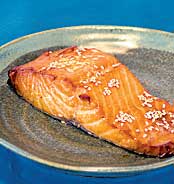 Â Dr. Eric Chan and Dr. Leslie Cho from the Cleveland Clinic, in Ohio waste no words in an excellent review.
 Dr. Eric Chan and Dr. Leslie Cho from the Cleveland Clinic, in Ohio waste no words in an excellent review.
Here are some highlights
Benefits
- High dietary intake of omega-3 is strongly linked to lower rates of cardiovascular disease in epidemiologic studies.
Response to treatment
- Fish oil supplements lower triglyceride levels.
- Starting at a triglyceride level of 816 mg/dL, 4 grams/day of omega-3 lowers triglyceride levels to 488 mg/dL, a 45% reduction.
- Normal: less than 150 mg/dL
- Borderline-high: 150–199 mg/dL
- High: 200–499 mg/dL
- Very high: 500 mg/dL
- In addition, HDL (good) cholesterol levels increased 9%.
- Omega-3 may also prevent arrhythmias, reduce inflammation, inhibit platelet aggregation, and lower blood pressure, all of which should reduce the risk of cardiovascular disease.
Safety
- Generally, omega-3 fatty acids are well tolerated.
- Adverse effects are limited to gastrointestinal complaints (discomfort, upset stomach) and a fishy odor.
- Common ways to prevent these effects are to freeze the capsules or take them at bedtime or with meals.
- My recommendation is that if you experience a fishy odor, buy another brand of omega-3.
- The risk of bleeding with omega-3 is minimal.
The bottom line?
According to the American Heart Association…
- High dietary intake of omega-3 is strongly linked to lower rates of cardiovascular disease in epidemiologic studies.
Response to treatment
- Fish oil supplements lower triglyceride levels.
- Starting at a triglyceride level of 816 mg/dL, 4 grams/day of omega-3 lowers triglyceride levels to 488 mg/dL, a 45% reduction.
- In addition, HDL (good) cholesterol levels increased by 9%.
- They may also prevent arrhythmias, reduce inflammation (although they have minimal impact on C-reactive protein), inhibit platelet aggregation, and lower blood pressure, all of which should reduce cardiovascular risk.
Safety
- Generally, omega-3 fatty acids are well tolerated.
- Adverse effects are limited to gastrointestinal complaints (discomfort, upset stomach) and a fishy odor.
- Common ways to prevent these effects are to freeze the capsules or take them at bedtime or with meals.
- My recommendation is that if you experience a fishy odor, buy another brand of omega-3.
- The risk of bleeding with omega-3 is minimal.
The bottom line?
- Healthy people should consume fish (preferably oily fish) at least twice a week.
- People with known coronary artery disease should take 1 gram of omega-3 per day
4/13/09 21:17 JR